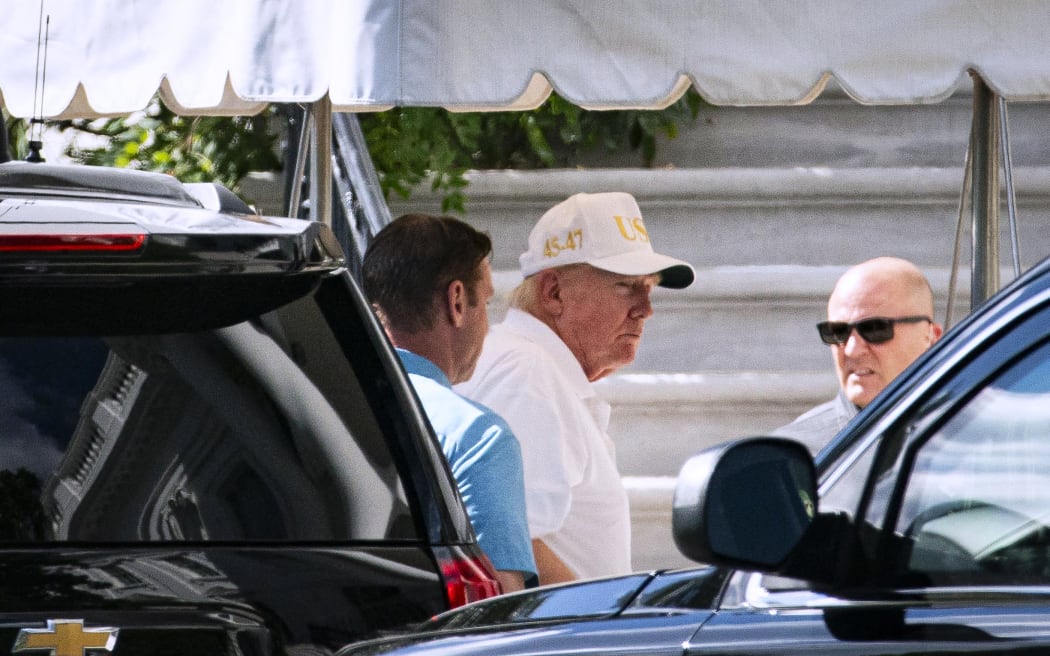World
Examining Presidential Health Cover-Ups in U.S. History

Speculation surrounding the health of former U.S. President Donald Trump surged over the weekend following the emergence of concerning images depicting swollen legs and bruising on his hands. At 79 years old, Trump is the second-oldest president in U.S. history. While no confirmed illness has been reported, his recent medical evaluations have reignited discussions about the longstanding tradition of health cover-ups among American presidents.
In July, Trump was examined for the swelling in his legs and diagnosed with chronic venous insufficiency. His physician confirmed that there was “no evidence of deep vein thrombosis (DVT) or arterial disease,” and all lab tests were reported as “within normal limits.” Despite this reassurance, Trump’s health remains a topic of debate, particularly as he responded to the circulating rumors on his Truth Social network, declaring, “NEVER FELT BETTER IN MY LIFE!”
The fascination with presidential health is not new. Unlike other countries, such as New Zealand, where only five prime ministers have died while in office, U.S. history is filled with examples of presidents who concealed significant health issues from the public. For instance, Franklin D. Roosevelt, the longest-serving president, was partially paralysed from polio and often used a wheelchair, yet he maintained a media agreement to limit public knowledge of his condition.
Historical Context of Health Concealment
The trend of obscuring health problems has deep roots in American politics. The case of former President Grover Cleveland stands out. In 1893, Cleveland underwent a secret surgery on the yacht Oneida to remove a tumour from his jaw. The surgery was conducted under extreme secrecy, and Cleveland’s team publicly claimed he was being treated for “rheumatism.” The truth about his condition remained hidden until years after his death.
Another significant example is John F. Kennedy, who was diagnosed with Addison’s disease and suffered from chronic back pain. Despite these serious health issues, Kennedy projected an image of vitality during his presidency. He even misled the public about his condition while campaigning, stating that no one with real Addison’s disease should run for the presidency.
The obscured health status of Woodrow Wilson also highlights the complexities of presidential incapacity. After suffering a massive stroke in October 1919, Wilson was unable to perform his duties effectively for the final year and a half of his presidency. Controversially, his wife, Edith Wilson, took on many responsibilities during his incapacitation, leading some to argue that she acted as the de facto president. This situation prompted discussions that eventually led to the 1967 amendment of the U.S. Constitution to clarify procedures for presidential incapacity.
The Modern Era of Presidential Health Concerns
In more contemporary times, the health of sitting presidents has continued to attract scrutiny. Former President Joe Biden, who left office at the age of 82, faced significant public concern over his mental and physical condition, particularly after a lackluster debate performance during his re-election campaign. Following his departure from office, Biden was diagnosed with prostate cancer, raising further questions about transparency regarding the health of U.S. leaders.
As Trump and Biden both navigate their advanced ages in public office, the conversation about presidential health remains pertinent. The average age of U.S. presidents at death has risen, with notable figures like Jimmy Carter reaching 100 years old, while others like Ronald Reagan and George H.W. Bush lived well into their nineties. The historical precedent of concealing health issues raises important questions about transparency and accountability in leadership.
In conclusion, as society becomes increasingly aware of health issues and advocates for transparency, the legacy of hidden health struggles among U.S. presidents continues to evolve. The revelations about past leaders highlight the importance of open communication regarding health, particularly in an era where public trust is paramount. The need for transparency in presidential health is more critical than ever as American voters consider the capabilities of their leaders in a rapidly changing world.
-

 World3 months ago
World3 months agoTest Your Knowledge: Take the Herald’s Afternoon Quiz Today
-

 Sports3 months ago
Sports3 months agoPM Faces Backlash from Fans During Netball Trophy Ceremony
-

 Lifestyle3 months ago
Lifestyle3 months agoDunedin Designers Win Top Award at Hokonui Fashion Event
-

 Sports3 months ago
Sports3 months agoLiam Lawson Launches New Era for Racing Bulls with Strong Start
-

 Lifestyle3 months ago
Lifestyle3 months agoDisney Fan Reveals Dress Code Tips for Park Visitors
-

 Health3 months ago
Health3 months agoWalking Faster Offers Major Health Benefits for Older Adults
-

 World3 months ago
World3 months agoCoalition Forms to Preserve Māori Wards in Hawke’s Bay
-

 Politics3 months ago
Politics3 months agoScots Rally with Humor and Music to Protest Trump’s Visit
-

 Top Stories3 months ago
Top Stories3 months agoUK and India Finalize Trade Deal to Boost Economic Ties
-

 World3 months ago
World3 months agoHuntly Begins Water Pipe Flushing to Resolve Brown Water Issue
-

 Entertainment3 months ago
Entertainment3 months agoExperience the Excitement of ‘Chief of War’ in Oʻahu
-

 Science3 months ago
Science3 months agoNew Interactive Map Reveals Wairarapa Valley’s Geological Secrets









